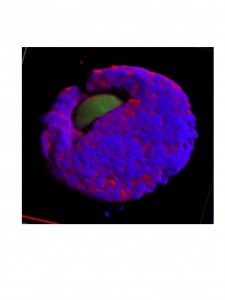Professor Lawrence J. Marsh, Developmental and Cell Biology, in collaboration with members of Dr. C-K Shen’s lab in Academica Sinica, Taiwan, found that the distribution of mutant Huntingtin protein (HTT) in the brains of mice changes in concert with changing pathology and progressive loss of motor control. One consequence of the changing redistribution of the protein is disruption of the nuclear envelope and reactivation of the cell cycle, which leads to death of the neuron.
Through this international collaboration, it was discovered that the distribution of the mutant HTT in the mammalian brain is dynamically changing during the course of disease. The study suggests a mechanism that may help people understand why degeneration is slow and progressive, as a small fraction of neurons are continuously pushed to reenter the cell cycle, which for a neuron, leads to death. Additionally, the study suggests that this distribution of the mutant HTT might be a future therapeutic target for patients.
Study appeared in Human Molecular Genetics.
The photo depicts an aggregate of the Huntingtin protein (green) impinging on the nuclear envelope (purple).
If you’d like to learn more about how you can support the faculty and research at the Biological Sciences School, please contact Andrew DiNuzzo at 949.824.2734 or adinuzzo@uci.edu.

